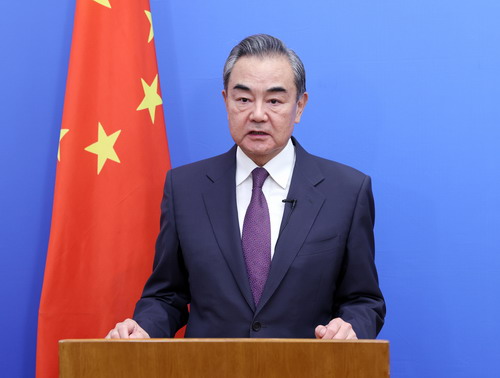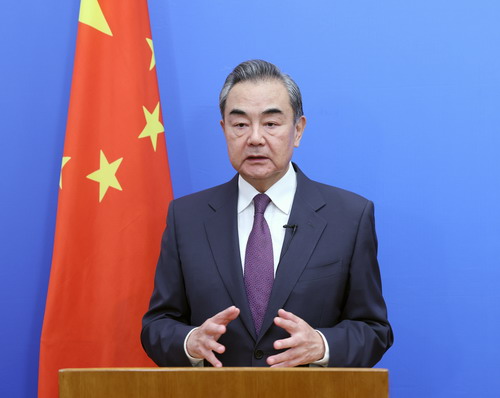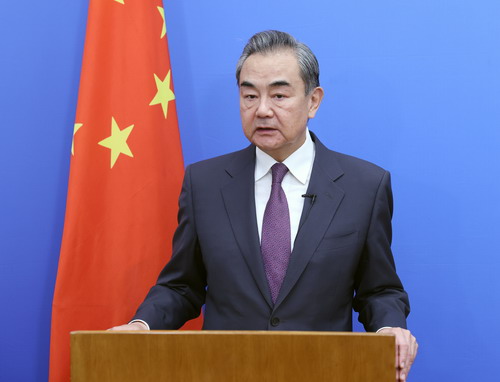
On October 27, 2021, State Councilor and Foreign Minister Wang Yi attended and addressed the Second Meeting of Foreign Ministers of the Neighboring Countries of Afghanistan via video link.
Wang Yi said, the first Meeting of Foreign Ministers of the Neighboring Countries of Afghanistan held this past September was a creative move. We officially launched the mechanism of coordination and cooperation among Afghanistan's neighboring countries, and issued a Joint Statement covering a broad range of issues. We established the political consensus to work together to address the changes in the Afghan situation, demonstrated our unique role as Afghanistan's neighbors, and made clear our reasonable concerns. The meeting received considerable attention from the international community. China is ready to work with all parties to build on the first foreign ministers' meeting, and enhance our strengths, uniqueness and cooperation as Afghanistan's neighbors so as to help ensure lasting peace and stability of Afghanistan.
Wang Yi pointed out, Afghanistan is at a crucial stage of shifting from turbulence to order. The country faces both challenges and opportunities, and difficulties and hopes. As its neighbors, we all hope to see Afghanistan enjoy peace, stability, economic development, ethnic harmony and good-neighborliness. Recently the international community has also expressed expectations and concerns over the evolution of the Afghan situation, including through the Moscow Format meeting last week. Under the new circumstances, we need to, on the basis of respecting Afghanistan's sovereignty, independence and territorial integrity and keeping to the "Afghan-led, Afghan-owned" principle, step up coordination and cooperation on Afghanistan-related issues for the purpose of replacing chaos with stability, preventing security spillovers, and helping the country embark on a path toward good governance.

Wang Yi put forward a four-point proposal:
First, making active engagement and showing guidance. We should attach importance to the opportunity that the Afghan interim government is adaptable and shapable, and get in touch and talk with it in a rational and pragmatic way to increase mutual trust and exert positive influence. We need to encourage Afghanistan to take a broad-based and inclusive political stance, adopt moderate and prudent domestic and foreign policies, and effectively protect the basic rights and interests of ethnic minorities, women and children. Meanwhile, we need to encourage it to resolutely fight terrorism and pursue good-neighborliness, friendship and cooperation. It is natural for neighbors to have some differences. But neither stand-off nor confrontation provides a sustainable solution. The right way is to be forward-looking, accommodate each other's reasonable concerns, and seek co-existence in peace.
Second, expanding multilateral coordination. We need to increase mutual reinforcement and build synergy between the various mechanisms on Afghanistan, and support the United Nations as a key coordinator in such fields as maintaining stability, preventing chaos, and providing emergency assistance. We should urge the United States and other Western countries to take up their primary responsibility in helping Afghanistan emerge from hardship to vitality. Among many others, they should at present lift unilateral sanctions on Afghanistan for its state assets to be used to meet people's urgent needs as soon as possible. The World Health Organization also needs to step up coordination and provide more vaccines, medical supplies and protective gears for Afghanistan to control the spread of COVID-19 at an early date.
Third, strengthening counter-terrorism cooperation. Not only do we need to encourage the new Afghan authority to make a clean break with terrorist forces, but we also need to support it in independently, resolutely and effectively combating all extremist and terrorist organizations including ISIL and the ETIM. We need to positively consider holding bilateral and multilateral counter-terrorism dialogues and cooperation with Afghanistan at an appropriate time. And we need to forge a united front against terrorism through multilateral platforms such as the UN and the Shanghai Cooperation Organization.
Fourth, promoting peace and reconstruction. As its neighbors, we need to take coordinated and robust actions to steadily increase economic and trade exchange with Afghanistan, explore infrastructure connectivity, and help Afghanistan take part in Belt and Road cooperation. The World Bank and the International Monetary Fund also need to consider how to resume financing support to Afghanistan, with a view to helping the country embark on a path of sound development.
Wang Yi said, as a responsible major country and Afghanistan's neighbor, China has all along been playing a constructive role on the Afghan issue. At the first foreign ministers' meeting, China announced RMB 200 million worth of emergency humanitarian assistance to Afghanistan. The first batch of supplies has arrived in Kabul and the delivery of the remaining is well underway. China will continue to provide support and help to the Afghan people to the best of its capability. China will work with all sides to promote the sound and sustained progress of the coordination and cooperation mechanism among neighbors of Afghanistan, and play a positive role in helping the Afghan people realize a safe, secure, and happy life and achieve peace and development at an early date.
All participating parties stressed that the Afghan situation is at a critical stage, and Afghanistan's neighbors and major countries in the region should coordinate their positions in a timely manner and take necessary measures to play a greater role. Countries primarily responsible for the difficulties in Afghanistan should earnestly deliver on their commitment, and provide Afghanistan with urgently needed assistance. The international community should, on the basis of respecting Afghanistan's sovereignty, independence and territorial integrity, conduct active engagement and dialogue with Afghanistan, and encourage and guide Afghanistan to form an inclusive government and implement modest and prudent internal and external policies, earnestly honor its commitments and resolutely combat terrorism, protect the rights of women, children and minority ethnic groups, and live in harmony with other countries, especially its neighboring countries. They called on the international community, the United Nations and other international organizations to provide more humanitarian assistance on an urgent basis, deepen economic cooperation and connectivity with Afghanistan, and help Afghanistan achieve security, stability and economic reconstruction.
This meeting was held both online and offline in Tehran, the capital of Iran. Iranian Foreign Minister Hossein Amir-Abdollahian chaired the meeting. First Vice President Mohammad Mokhber delivered remarks at the opening ceremony and UN Secretary-General Antonio Guterres delivered remarks via video link. Turkmen Deputy Prime Minister and Foreign Minister Rashid Meredov, Pakistani Foreign Minister Shah Mahmood Qureshi, Tajik Foreign Minister Sirojiddin Muhriddin and Uzbek Foreign Minister Abdulaziz Kamilov attended the meeting. Russian Foreign Minister Sergey Lavrov made a speech via video link. Special Envoy for Afghan Affairs of the Ministry of Foreign Affairs Yue Xiaoyong attended the meeting in person. The meeting published a joint statement. As agreed by all parties, the third round of the meeting will be held in 2022 in China.

